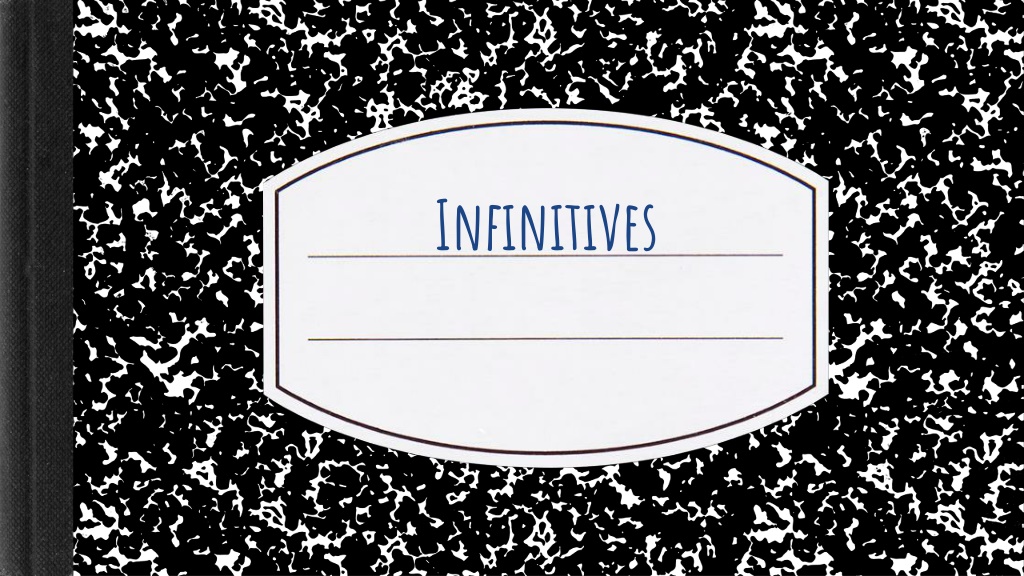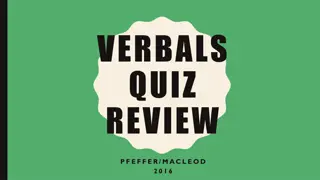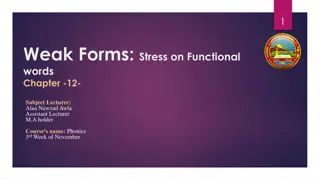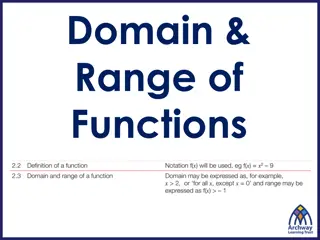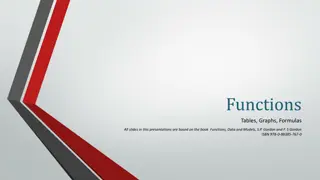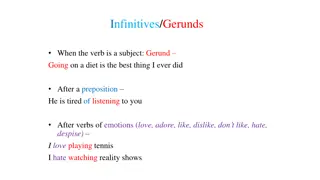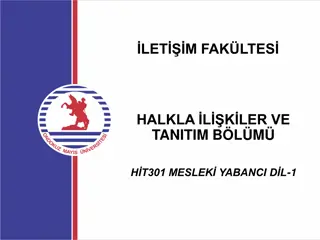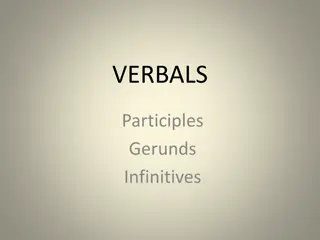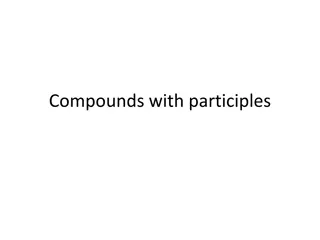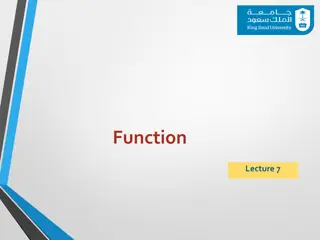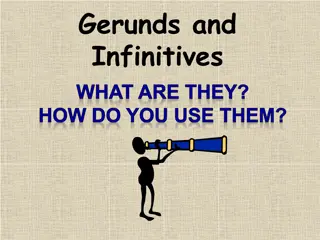Understanding Infinitives: Forms, Functions, and Examples
Infinitives are simple forms of verbs that start with "to" and can function as nouns, adjectives, or adverbs. They can be used as subjects, direct objects, subject complements, or adjectives to describe nouns. Examples and practice exercises are provided to enhance understanding of infinitives.
Download Presentation

Please find below an Image/Link to download the presentation.
The content on the website is provided AS IS for your information and personal use only. It may not be sold, licensed, or shared on other websites without obtaining consent from the author. Download presentation by click this link. If you encounter any issues during the download, it is possible that the publisher has removed the file from their server.
E N D
Presentation Transcript
Infinitives Infinitives are simple forms of verbs that have the word to before it. Examples: to jump, to carry, to do, to finish, to play, to laugh, to cry Infinitives can function as nouns, adjectives, or adverbs. Because an infinitive is not a verb, you cannot add s, es, ed, or ingto the end of the verb. Infinitives only look like verbs but do the work of other parts of speech!
Infinitives as Nouns Infinitives can be used as either the subject of the sentence, a direct object of a verb, or a subject complement. Remember -Direct Objects receivethe action of the verb! Ex: She threw the ballfor her dog. Subject Complements follow linking verbs like is or was and connect back to our subjects. EX: He is a mason.
Infinitives as Nouns (Subject) Examples Infinitives as a Subject: To sleepis the only thing Eli wants after his double shift waiting tables at the neighborhood caf . To writeis her greatest ambition in life. To Speakonstage was nothing to him, but to speakon the phone scared him.
Infinitives as Nouns (Direct Object) Examples Infinitives as a Direct Object: No matter how fascinating the biology dissection is, Emanuel turns his head and refuses to look. She knows not to throwa ball across the room. He hopes to becomePresident one day.
Infinitives as Nouns (Subject Complement) Examples Infinitives as a Subject Complement. Her hobby is to garden. His main chore is to mowthe lawn. My dream is to opena cat cafe in Atlanta.
Infinitives as Nouns (Practice) In each of the sentences below, find the infinitives. Is it the subject, direct object, or subject complement? 1) To follow this advice may be difficult. 2) Everyone wants to enjoy life. 3) She likes to be admired. 4) Her advice was to study before class. 5) To drive very fast here is not advisable. 6) A sign of bravery is to stand up for others.
Infinitives as Adjectives Infinitives can be used to describe nouns and in these situations, function as adjectives. Review -Adjectives answer these questions: 1) What kind? 2) How many? 3) Which one?
Infinitives as Adjectives (Practice) Look at each sentence. Find the infinitive, and show what noun it may be describing. 1) Your idea to spend the day together sounds great. 2) Joe is the man to see about the job. 3) This must be the best route to take. 4) Your attitude is the best attitude to have.
Infinitives as Adverbs Infinitives can also function as adverbs in a sentence. Adverbs can describe a verb, an adjective, or another adverb. Review -Adverbs answer these questions: 1) How? 2) When? 3) Where? 4) To What Extent? 5) Why?
Infinitives as Adverbs (Practice) Look at each sentence. Find the infinitive, and show what verb it may be describing. 1) I cook to save money. 2) I was glad to hear your voice. 3) I was surprised to see her short hair. 4) the manager was wise to hire her for the position.
Split Infinitives In most cases, it is considered bad grammar to split infinitives apart by putting words between the To and the verb. Here are some examples of split infinitives; remember to avoid this! To quickly run To deeply understand To quickly lie To noisily laugh To boldly go To
Special Cases An infinitive will almostalways begin with to. Exceptions do occur, however. An infinitive will lose its to when it follows certain verbs. These verbs are feel, hear, help, let, make, see, and watch.
Special Cases examples As soon as Theodore feltthe rain splatteron his skin, he knew that he had a good excuse to return the lawn mower to the garage. When Danny heardthe alarm clock buzz, he slapped the snooze button. Although Dr. Ribley spent an extra class period helpingus understandExponents, we still bombed the test.
Practice -In the following sentences, find the infinitive and decide if it is being used as a noun (and if it is the subject, direct objects, or subject complement), an adverb (and what it modifies), or an adjective (and what it modifies). 1. I can't afford to eat out tonight, so we should hang out another night. 2. We are going to sleep now. 3. Mary requested to see you after the meeting. 4. Her job is to clean the toilets every day. 5. The Super Bowl is the game to watch.
Practice -In the following sentences, find the infinitive and decide if it is being used as a noun (and if it is the subject, direct objects, or subject complement), an adverb (and what it modifies), or an adjective (and what it modifies). 1. I love to look into shop windows at food. 2. Dave failed to come on time. 3. After school, her hobby is to bake cookies. 4. I bought a patch to stop smoking. 5. To dance is my little girl's dream.
Practice -In the following sentences, find the infinitive and decide if it is being used as a noun (and if it is the subject, direct objects, or subject complement), an adverb (and what it modifies), or an adjective (and what it modifies). 1. To go to college is a good idea for many, but not all. 2. She wants me to drive. 3. Do you swear to tell the truth, the whole truth, and nothing but the truth? 4. I told you to wait! 5. We must sudy to learn.
